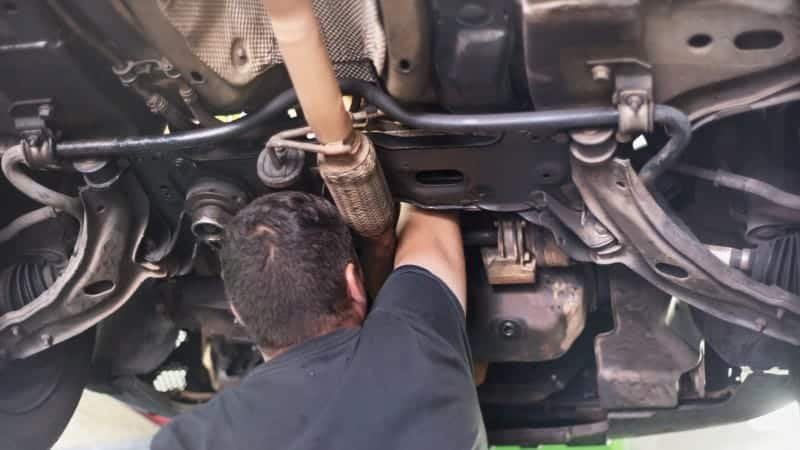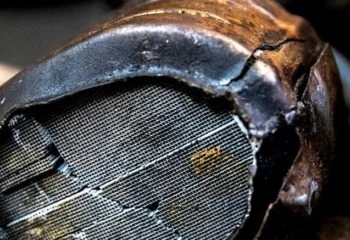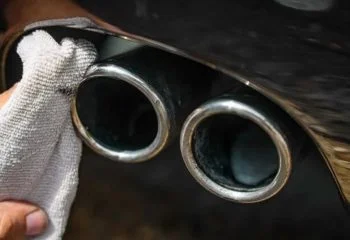If your car seems to be losing power and you’re seeing black smoke billowing out from the exhaust pipe, you may have a leak in the exhaust system.
Exhaust leaks can cause a variety of problems, including decreased fuel economy, poor performance, and even dangerous carbon monoxide poisoning.
In this blog post, we’ll discuss the exhaust leak symptoms and causes, as well as how to fix them yourself. Let’s get started!
What's in this post?
What is an exhaust leak?
An exhaust leak is any leakage in the system that allows fumes to escape from the engine. This can happen at any point along the length of the exhaust system, including the manifold, pipes, gaskets, or catalytic converter.
Exhaust leaks are often caused by damage or wear and tear on these parts, which can be exacerbated by rust.
What are exhaust leak symptoms?
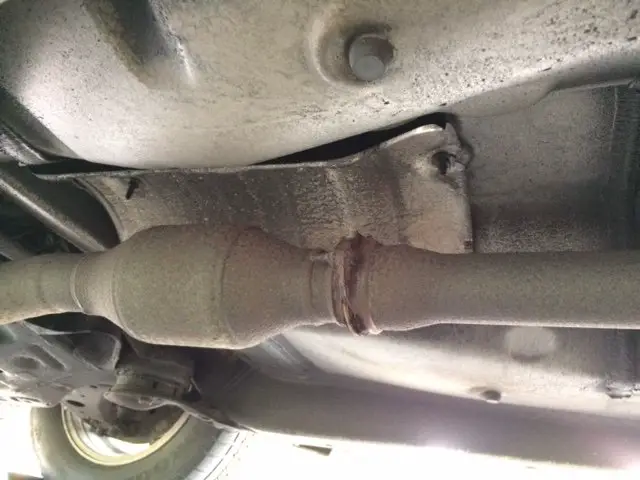
There are several exhaust leak symptoms that can indicate you have an exhaust leak. You may notice:
- A decrease in fuel economy
- Black smoke coming from the tailpipe
- A hissing or whistling noise when the engine is running
- A rattle under the car when driving over bumps
- The smell of exhaust fumes inside the car
- Noise that gets louder
- Vibrating gas pedal
- Loud engine noise
- Vibrating gas pedal
- Reduced performance
- Visible signs
- Check engine light turn ON
- Failed emission test
A decrease in fuel economy
When there is an exhaust leak, the engine has to work harder to push the exhaust out, which can lead to decreased fuel economy.
In addition, an exhaust leak can cause the engine to run lean, which means that there is more air and less fuel in the mixture. This can also lead to decreased fuel economy.
As a result, if you notice that your fuel economy has decreased, it may be due to an exhaust leak.
If you notice your car’s fuel economy decreasing, it could be a sign that your exhaust system has a leak.
Black smoke coming from the tailpipe
The symptom occurs when there is a leak in the exhaust system and unburned fuel is being drawn into the system. This can happen for a number of reasons, including a cracked exhaust manifold or a damaged gasket.
An exhaust leak can lead to decreased fuel efficiency and increased emissions, so it’s important to have the problem fixed as soon as possible.
If you notice black smoke coming from your tailpipe, be sure to have your vehicle inspected by a qualified mechanic.
A hissing or whistling noise when the engine is running
If you notice a hissing or whistling noise when the engine is running, it’s likely that you have an exhaust leak.
This noise is caused by the escape of exhaust gases from the engine through a leak in the system.
The most common cause of an exhaust leak symptom is a cracked exhaust manifold.
Manifolds can develop cracks over time due to the constant expansion and contraction that they undergo during operation. When a crack forms, exhaust gases can escape and create a distinctive hissing noise.
In some cases, the exhaust leak symptom may also be accompanied by a decrease in engine power. This happens because the escaping exhaust gases reduce the overall efficiency of the engine.
If you suspect that you have an exhaust leak symptom, it is important to have it checked out by a qualified mechanic as soon as possible. Ignoring the problem can lead to further damage to your engine.
A rattle under the car when driving over bumps
One symptom of an exhaust leak is a rattling noise coming from under the car when driving over bumps.
This is caused by the exhaust gases escaping from the leak and coming into contact with the suspension. The vibrations from the suspension will cause the exhaust gases to resonate, which creates a rattling noise.
If you suspect that you have an exhaust leak, it is important to have it repaired as soon as possible.
Smell of exhaust fumes inside the car
Exhaust fumes are dangerous to breathe in, so it’s important to get an exhaust leak symptom checked out as soon as possible.
There are a few different ways that exhaust fumes can enter the cabin of your car. The most common way is through a crack in the exhaust pipe.
This can happen if your exhaust pipe is old or damaged. Another way is if there’s a gap between the header and the exhaust manifold. These leaks are usually small, but they can cause big problems.
If you smell exhaust fumes while you’re driving, pull over and call a tow truck. Don’t try to drive any further until the problem is fixed.
Loud engine noise
The exhaust system is responsible for carrying fumes and noise away from the engine, so if there’s a leak, those fumes and noise will escape into the cabin of the car.
In addition to being noisy, an exhaust leak can also lead to a loss of power and decreased fuel efficiency.
If you think you might have an exhaust leak, it’s important to get it checked out by a mechanic as soon as possible. Otherwise, you could be doing serious damage to your engine.
Vibrating gas pedal
There are several reasons why an exhaust leak could cause a vibrating gas pedal.
One possibility is that the leak is causing the engine to run less efficiently, resulting in increased vibration. Another possibility is that the leak is causing the exhaust system to work harder, which can also lead to vibration.
Reduced performance
One symptom of an exhaust leak is poor fuel economy. If your engine is not able to properly expel exhaust gases, then it will have to work harder to continue operating.
This will cause your fuel consumption to increase, and you may notice that your car doesn’t have the same power that it used to.
Visible signs
One symptom of a leaking exhaust manifold is black stains and burned components around the source of the leak. You also may notice apparent fractures in the exhaust manifold as you conduct a visual inspection.
The exhaust manifold’s fasteners, such as studs, screws, or nuts, may corrode and fall away with time. A deformed exhaust manifold, on the other hand, may cause bolts to over-extend and snap off.
If you notice any of these symptoms in your exhaust manifold, it is important to take action to repair the leak as soon as possible to avoid further damage.
Check engine light turn ON
This is because the sensors that monitor the engine’s emissions levels are designed to detect changes in the composition of the exhaust gases.
If there is an increase in unburned hydrocarbons or carbon monoxide, it will trigger the check engine light. Exhaust leaks can be very dangerous as they can allow harmful gases into the cabin of the vehicle.
Failed emission test
If you have a leak in your exhaust system, it will impact the results of your annual emission test.
These leaks allow gases to escape from the engine, which can throw off the air/fuel mixture. As a result, your vehicle will emit more pollutants than it should, and you will fail the emission test.
If you suspect that you have a leak, it is important to get it fixed before taking your car in for the test. Otherwise, you may be required to make costly repairs before you can pass.
Common causes of exhaust leaks
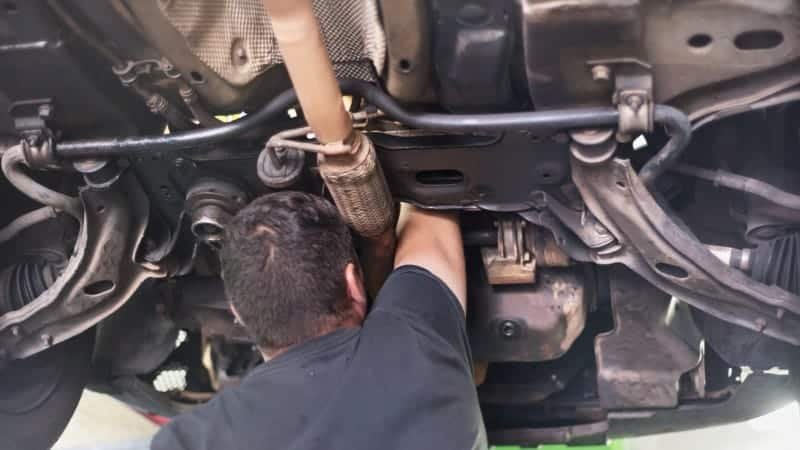
There are a few different things that can cause an exhaust leak. Here are some common causes:
Damaged exhaust pipe
There are several factors that can contribute to an exhaust leak. The most common cause is damage to the exhaust pipe.
This can happen if your car hits a pothole or curb, or if you drive over a speed bump too fast. It can also happen if you don’t have your car serviced regularly and the exhaust system isn’t properly maintained.
Corrosion
Another common cause of exhaust leaks is corrosion. This is especially common in older cars that have been driven for many years.
If you live in an area with a lot of salt on the roads, that can also speed up the process of corrosion. It’s important to have your car inspected regularly so that any problems can be caught early and fixed before they become serious.
Damaged or broken exhaust manifold
The exhaust manifold is what connects the engine to the exhaust pipe. It’s made of metal, and over time it can corrode or crack.
If you have a damaged or broken exhaust manifold, it can cause a big leak. This type of leak is usually easy to spot because you’ll see black stains and burned components around the source of the leak.
It’s important to have this problem fixed as soon as possible because a leaking exhaust manifold can be very dangerous.
Rusted or disintegrated studs, screws, or nuts
The exhaust manifold is held together by studs, screws, or nuts. With time, these fasteners can become corroded or disintegrated.
If this happens, it can cause the exhaust manifold to come loose and start leaking. You may also notice that the bolts are over-extended and snap off.
If you notice this problem, it’s important to take action to repair the leak as soon as possible to avoid further damage.
Deformed exhaust manifold
Another common cause of exhaust leaks is a deformed exhaust manifold. This can happen if the engine overheats or if the car has been in a front-end collision.
If you notice that the exhaust manifold is deformed, it’s important to have it fixed as soon as possible. Otherwise, the bolts could over-extend and snap off, which would cause a much bigger problem.
Faulty gasket
Over time, the gaskets that seal the joints in the exhaust system can deteriorate, allowing gases to escape. In some cases, an exhaust leak can also be caused by a clogged catalytic converter.
This is a relatively rare problem, but it can occur if the converter becomes clogged with soot and debris.
If you suspect you have an exhaust leak, it’s important to have it repaired as soon as possible. Not only will this improve your car’s performance, but it will also help to protect your health from exposure to harmful fumes.
How harmful is exhaust leak?
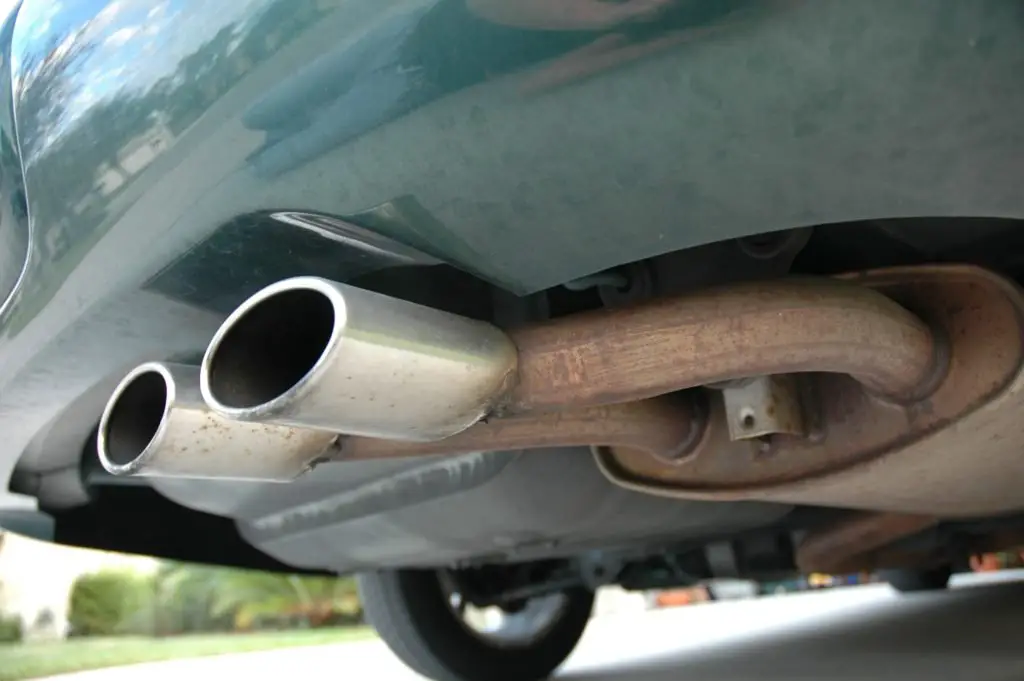
There are many reasons to repair an exhaust leak, including the noise and danger. Below are a few:
Noise
The most obvious reason to fix an exhaust leak is the noise. If you have a small leak, it might not make much of a difference. But if the leak is bigger, it can make your car sound very loud.
Not only is this annoying, but it can also be dangerous. If you’re driving with a loud exhaust, other drivers might not be able to hear you coming, and that could lead to an accident.
Health hazards
Another reason to fix an exhaust leak is for your health. Exhaust fumes contain harmful chemicals, including carbon monoxide.
If these fumes are leaking into your car, they can cause serious health problems, including dizziness, nausea, headaches, and even death.
It’s important to have any exhaust leaks fixed as soon as possible to avoid these health hazards.
Carbon monoxide poisoning
One of the most serious health hazards of an exhaust leak is carbon monoxide poisoning. This can happen if you have a big leak, or if you’re driving with the windows up and the air conditioning on.
If you start to feel dizzy, nauseous, or tired, pull over and get out of the car immediately. These are all symptoms of carbon monoxide poisoning.
If you’re exposed to high levels of carbon monoxide, it can be fatal. That’s why it’s so important to have any exhaust leaks fixed as soon as possible.
Reduced fuel efficiency
Another problem with exhaust leaks is that they can reduce your car’s fuel efficiency.
If there’s a hole in the exhaust system, it means that some of the gases that are supposed to be expelled from the car are actually being released into the atmosphere.
This causes your car to work harder than it needs to, which uses up more gas. In some cases, an exhaust leak can reduce your car’s fuel efficiency by as much as 10%.
Increased emissions
When a vehicle has an exhaust leak, it can cause increased emissions. The main reason for this is that the engine is not able to run as efficiently when there is a leak.
The engine will have to work harder to push the exhaust out, and this can lead to an increase in emissions. In addition, exhaust leaks can also cause the engine to run hotter than usual.
This can cause the catalytic converter to break down, which can lead to an increase in emissions. Not only is this bad for the environment, but it can also lead to your car failing an emissions test.
Engine Damage
An exhaust leak can cause engine damage in several ways.
First, it can introduce unburned fuel into the exhaust system. This fuel can then ignite and cause a backfire, which can damage the engine.
Second, an exhaust leak can cause the engine to run lean, meaning that there is not enough fuel being burned.
This can lead to pre-ignition, which is when the air-fuel mixture ignites before the spark plug fires. Pre-ignition can cause knocking and pinging, which can damage the engine.
For these reasons, it is important to have any exhaust leaks fixed as soon as possible.
Clogged Catalytic Converter
Another problem with exhaust leaks is that they can cause the catalytic converter to become clogged.
The exhaust system is responsible for carrying dangerous fumes away from the engine, and the catalytic converter is responsible for converting those harmful gases into harmless ones.
If there is a leak in the exhaust system, those fumes can escape and enter the engine compartment, causing the catalytic converter to work harder than it should.
In extreme cases, an exhaust leak can cause the converter to overheat and fail completely.
That’s why it’s important to have any exhaust leaks fixed as soon as possible not only to prevent converter damage, but also to protect yourself from exposure to harmful fumes.
Bad Oxygen Sensor
An exhaust leak can cause a bad oxygen sensor for several reasons.
First, it can allow unburned fuel to enter the exhaust stream. This fuel will then be detected by the oxygen sensor as a rich condition, causing the vehicle’s computer to adjust the air/fuel mixture accordingly.
An exhaust leak can also allow fresh air to enter the exhaust stream, resulting in a lean condition detected by the oxygen sensor.
In either case, the computer will make adjustments to the air/fuel mixture in an attempt to compensate, but these changes can result in reduced fuel economy and increased emissions.
If you suspect an exhaust leak, it is important to have it repaired as soon as possible to avoid damage to your oxygen sensor.
How to fix an exhaust leak
If you have an exhaust leak, the best thing to do is to take your car to a mechanic and have them fix it.
They will be able to identify the source of the leak and make the necessary repairs. In most cases, the entire exhaust system will need to be replaced.
If you’re not sure whether or not you have an exhaust leak, there are a few things you can do to check.
First, start the engine and let it run for a few minutes. Then, turn off the engine and get out of the car. Walk around to the back of the car and listen for any hissing or whistling sounds.
If you hear anything, that’s a good indication that you have an exhaust leak.
Another way to check is to look for any black stains or soot around the joints in the exhaust system. If you see any, that’s another sign that you have a leak.
If you’re still not sure, the best thing to do is to take your car to a mechanic and have them check it out.
They’ll be able to tell you for sure whether or not you have an exhaust leak and advise you on the best course of action.
How much does it cost to fix an exhaust leak?
The cost of repairing an exhaust leak will vary depending on the severity of the leak and the type of vehicle you have.
If the entire exhaust system needs to be replaced, this can cost anywhere from $500 to $2000, depending on the make and model of your vehicle.
If you have a mild exhaust leak, it may be possible to have it repaired without replacing the entire system.
This would typically involve welding or patching the hole in the exhaust pipe. The cost of this type of repair will vary depending on the size and location of the leak, but it is typically much less than replacing the entire system.
Labor cost is usually between $50 to $100 per hour. If you need to replace the entire exhaust system, it will take a mechanic a half day to do the job.
This means that labor costs can range from $200 to $400, depending on the hourly rate of the mechanic.
If you have a mild exhaust leak, it may only take them an hour or so to repair it, which would bring the labor cost down to around $100.
The bottom line is that the cost of repairing an exhaust leak can vary quite a bit, depending on the severity of the leak and the type of vehicle you have.
If you’re concerned about the cost, the best thing to do is to take your car to a mechanic and have them give you an estimate.
Either case, it is important to have any exhaust leaks fixed as soon as possible to avoid damage to your engine and catalytic converter.
Prevention tips for avoiding exhaust leaks in the future
There are a few things you can do to prevent exhaust leaks in the future.
First, make sure to have your car’s exhaust system inspected regularly. This will allow any potential problems to be caught early and fixed before they turn into bigger issues. A well-maintained engine is less likely to develop exhaust leaks.
Second, if you live in an area with a lot of salt on the roads, make sure to wash your car often to prevent corrosion. Salt can cause the metals in your exhaust system to rust and degrade, increasing the likelihood of leaks.
And finally, if you hear any strange noises coming from your car’s exhaust system, don’t ignore them! Take your car to a mechanic right away so they can diagnose and fix the problem.
The sooner you catch a problem, the easier and less expensive it will be to fix.
FAQs about Exhaust Leak Symptoms
Can I drive with a leak in the exhaust?
A leak in your exhaust can be dangerous and is also illegal in most states. When your car’s exhaust system leaks, deadly carbon monoxide can enter the cabin of your car, putting you and your passengers at risk of carbon monoxide poisoning.
In addition, a leaking exhaust can also make your car much louder than normal, which can be extremely annoying for you and your neighbors.
If you have a leak in your exhaust, it’s best to have it repaired as soon as possible by a qualified mechanic. Not only will this keep you safe on the road, but it will also help you avoid getting pulled over and receiving a ticket.
How long can you go with an exhaust leak?
Around 2 weeks is the maximum time you should wait to get an exhaust leak fixed.
Exhaust leaks are dangerous because they can allow deadly carbon monoxide to enter the cabin of your car. Waiting too long to fix the problem could put you and your passengers at risk of carbon monoxide poisoning.
How do I know if my exhaust needs replacing?
If you notice your car’s performance declining, it may be time to get the exhaust system checked.
Other signs that the system needs to be replaced include an increase in engine noise, rattling sounds coming from under the car, and visible cracks or holes in the exhaust pipe.
While these problems can often be addressed with repairs, it is sometimes necessary to replace the entire system.
How often do exhausts need replacing?
In general, most cars will need the entire system replaced every 5 to 7 years.
However, the frequency with which you need to replace your car’s exhaust system will depend on a number of factors, including the make and model of your vehicle, how often you drive, and the roads you typically drive on.
How long does it take to replace an exhaust system?
It typically takes around 4-6 hours to replace an entire exhaust system.
However, the actual time will depend on the make and model of your vehicle, as well as the experience of the mechanic.
Can I replace my own exhaust?
Replacing an exhaust system is a fairly difficult task that requires special tools and knowledge.
Unless you are a qualified mechanic, it is best to leave this job to the professionals.
Trying to replace your own exhaust could result in serious injury if you don’t know what you’re doing.
Are exhausts expensive to replace?
The cost of replacing an exhaust system will vary depending on the make and model of your car.
In general, however, you can expect to pay anywhere from $500 to $2000 for a new system.
Can you get carbon monoxide poisoning from an exhaust leak?
Yes. Carbon monoxide is a colorless, odorless gas that can be deadly if inhaled in large quantities.
Exhaust leaks allow carbon monoxide to enter the cabin of your car, putting you and your passengers at risk of poisoning.
How can a faulty exhaust affect your vehicle?
A faulty exhaust can cause a number of problems for your car, including decreased fuel efficiency, increased emissions, and engine damage.
It can also make your car much louder than normal, which can be extremely annoying for you and your neighbors.
Can an exhaust leak cause your car to overheat?
Yes. An exhaust leak can cause your car to overheat because it allows hot gases to escape from the engine.
These hot gases can damage the engine and cause it to overheat.
Can an exhaust leak cause your check engine light to come on?
Yes. An exhaust leak can cause your check engine light to come on because it allows harmful gases to enter the cabin of your car.
These gases can trigger the sensor that turns on the check engine light.
How do you temporarily fix a broken exhaust?
There are a few ways to temporarily fix a broken exhaust, but it is important to keep in mind that these are only temporary solutions.
The best way to fix a broken exhaust is to take it to a qualified mechanic and have it repaired or replaced.
Some people choose to use duct tape or silicone to seal the leak, but this is not a permanent solution and can actually make the problem worse.
Can an exhaust leak cause your car to shake?
Yes. An exhaust leak can cause your car to shake because it allows hot gases to escape from the engine.
These hot gases can damage the engine and cause it to overheat.
Can an exhaust leak cause your car to stall?
Yes. An exhaust leak can cause your car to stall because it allows harmful gases to enter the cabin of your car.
These gases can trigger the sensor that turns on the check engine light.
Can an exhaust leak cause your car to smell bad?
Yes. An exhaust leak can cause your car to smell bad because it allows harmful gases to enter the cabin of your car.
These gases can be extremely dangerous and should be avoided at all costs.
How long does it take to weld an exhaust?
It typically takes around 20 minutes – 1 hour to weld an exhaust.
However, the actual time will depend on the make and model of your vehicle, as well as the experience of the welder.
Can I weld my own exhaust?
Welding an exhaust is a fairly difficult task that requires special tools and knowledge.
Unless you are a qualified welder, it is best to leave this job to the professionals.
Trying to weld your own exhaust could result in serious injury if you don’t know what you’re doing.
Can a broken exhaust pipe be welded?
Yes, a broken exhaust pipe can be welded. However, it is important to keep in mind that this is not a permanent solution and the pipe will likely need to be replaced eventually.
Can an exhaust leak be fixed with JB Weld?
JB Weld is a type of epoxy that can be used to fix many different types of leaks.
However, it is important to keep in mind that this is not a permanent solution and the leak will likely reappear after a few months.
To sum up
In summary, if you are experiencing any of exhaust leak symptoms, have your car checked by a professional as soon as possible. Exhaust leaks can be dangerous and should not be ignored.
If you have a small exhaust leak, you may be able to fix it yourself with a patch kit or by tightening the bolts/clamps. However, if the leak is large or if you are unsure of how to fix it, we recommend taking your car to a mechanic.

